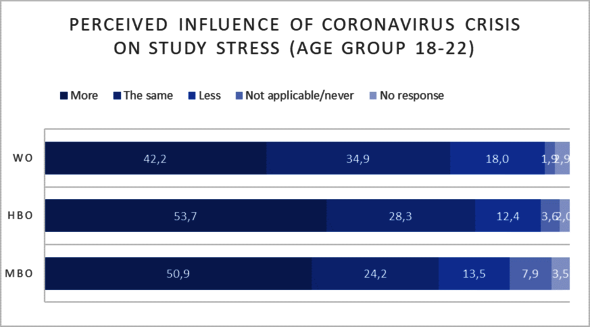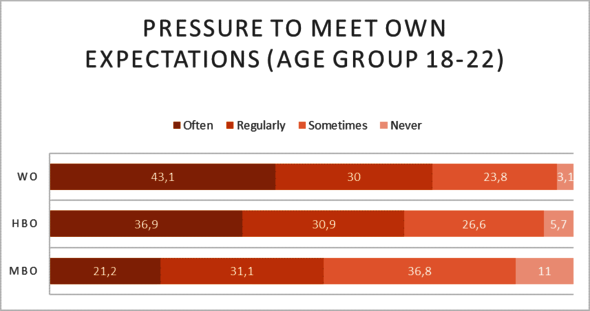Students suffer more from stress, says Statistics Netherlands
Because of the coronavirus crisis almost half of the students in the Netherlands are suffering more from study stress, Statistics Netherlands (CBS) reports. And the further they get in their study programme, the more they worry about their future.
CBS questioned more than eight thousand young people between the ages of 12 and 25 about their wellbeing during the COVID-19 pandemic. The questionnaire was distributed from February to April 2021, during the third wave of COVID-19.
The coronavirus crisis has hit young people hard, CBS confirms. An increasing number of young people from 18 to 25 have mental health issues. In the crisis that has risen from 12 to 24 percent: “This is characterised by gloom, depression, nervousness, agitation and unhappiness.”
Miss ‘very much’
Were students upset at being unable to go to in-person classes during the lockdown? The higher the level of education, the worse they found the situation. A quarter of senior secondary vocational education students (MBO) missed the classes ‘very much’, CBS writes, as opposed to 40 percent of higher professional education students (HBO) and half of research-oriented higher education students (WO).
Almost half of the students suffer more from study stress than before the coronavirus outbreak, according to the students themselves. A small number of students actually had less stress than before: one in eight in higher professional education and more than one in six in research-oriented higher education.
Stress about the future increases as students get further advanced in their study programme, CBS observes. 40 percent of 19-year-old research-oriented higher education students sometimes suffer stress about their future career and 23 percent about finding housing. “Among 23-year-old research-oriented higher education students the figures are 68 and 50 percent respectively.”
But the stress does not always come from outside. Students also feel pressure to meet their own expectations. It is striking that senior secondary vocational education students are a bit more relaxed about this than students in higher professional education and research-oriented higher education.
Social media
Only one in ten young people occasionally experience stress from social media. According to the statisticians, students in higher education are somewhat more susceptible to this. Almost a quarter of students in research-oriented higher education feel agitated when a message comes in that they cannot read straight away, as opposed to fifteen percent of students in senior secondary vocational education and higher professional education. Likes, shares and reactions to posts give almost half of the students in higher professional education and research-oriented higher education ‘a good feeling’, as opposed to 39 percent of senior secondary vocational education students.
The results of the survey are somewhat in line with previous studies, CBS writes. “The overall picture is that, in particular, the mental health of young people in the Netherlands has declined because of the coronavirus crisis.”
Previous studies
Among other studies, CBS refers to the survey by the RIVM and the Trimbos Institute that appeared last month. It reported that half of all students have mental health issues, roughly twice as many as CBS is now reporting about all young people.
Those results shocked student organisations and higher education institutions. Education Minister Ingrid van Engelshoven emphasised that a new lockdown of higher education would be bad for the mental health of students.
Two professors were, however, critical of the sample, because relatively few students completed the questionnaire: the response was only 11.7 percent. That would distort the findings. One of them, Peter van der Velden, has greater confidence in the sample taken by CBS. That achieved a response of 43 percent.




Discussion